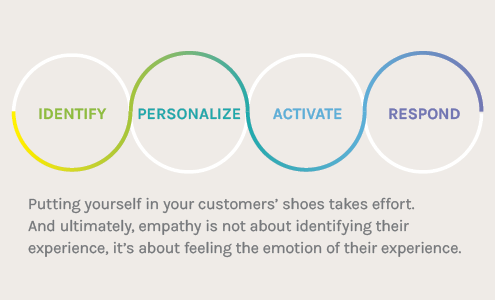What is empathy? Empathy is not only the ability to understand the feelings of others but to actually share those feelings. This is not always easy in a research context, but the closer you can get to actually “feeling” what your consumers feel, the more in tune you will be to their behaviors, needs and tensions.
Successful brands put a priority on empathizing with their customers to develop deeper connections that result in loyalty and repeat purchase. Insights grounded in empathy help uncover opportunities for brands to fulfill unmet needs through better products, messaging, customer service, packaging, and other marketing touchpoints. The result is improved brand performance and growth.
A great way to embrace empathy in your research is to get in-the-moment with your customers. This doesn’t mean watching a video or reading a research summary…it means taking the time to connect to people in a way that allows you to see life through their eyes and their hearts.
Insights grounded in empathy help uncover opportunities for brands to fulfill unmet needs through better products, messaging, customer service, packaging, and other marketing touchpoints. The result is improved brand performance and growth.”
I regularly encourage executives and brand teams to get out of their office and in front of customers to observe them in their environment, allowing them to truly understand how they live. For instance, we’ve taken a brand team along to a wedding registry with a same-sex couple. We’ve also had executives of one of the largest paper goods companies in North America visit low-income households to understand what they go through just to secure the basics.
We believe true empathy for your customers can only happen when you are immersed in their daily lives and usage contexts…walking the walk with them, whether it’s seeing all the chaos a shopper experiences in New York City or the struggles of a resident of a rural farm community.
Ultimately, empathy is valuable for the critical insights that emerge by truly understanding your customers. These insights are what lead you to the next new idea or shape future strategies and innovation. As an example, a leading manufacturer wanted to explore product line extensions. The team had come up with several different thought-starter ideas. By taking the time to understand their customers’ daily context and allowing those customers to use prototype products on the job, the company began to understand more deeply how a new product could address pain points. In fact, during this research journey, we helped the company discover an unidentified need that spawned two new product ideas.

Putting yourself in your customers’ shoes takes effort. And ultimately, empathy is not about identifying their experience, it’s about feeling the emotion of their experience. To gain inspiration that creates wonder and delight with customers, there’s simply no better place to start the journey than with research grounded in empathy.




